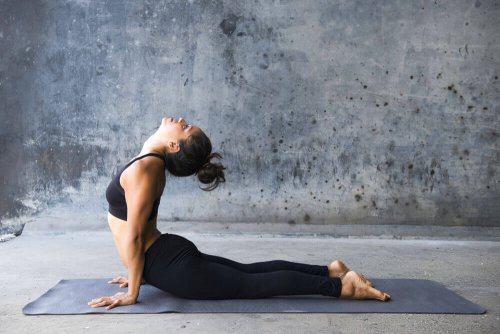How Often Should You Practice Yoga for Weight Loss?


Reviewed and approved by Doctor Carlos Fabián Avila
Yoga is great for weight loss if you’re in search for the perfect way to do so if you want to try something different. Furthermore, don’t think this discipline is just about meditation and muscle stretching, it’s also slimming.
To see results, the important thing is perseverance and discipline. All physical activities require a minimum daily or weekly commitment in order for the body to change and to begin to look and feel better. Yoga is no exception and requires perseverance and effort.
How yoga helps you lose weight
When practicing yoga, the whole body is in constant movement, although the level of effort and demand varies according to the postures. If your goal is to lose weight, keep in mind that for this to happen it is necessary to burn more calories than you consume.
Therefore, it’s essential that, in addition to physical activity, you review your diet and avoid high-calorie foods. As for the effectiveness of this discipline to lose those extra pounds, some studies indicate it can work in different ways to achieve a healthy weight.
For example, research published in Evidence-Based Complementary and Alternative Medicine suggests that people who develop mindfulness through yoga tend to avoid eating unhealthy foods. This is due to the fact that anxiety and stress, the main causes of binge eating decrease.
Furthermore, some say this physical and mental discipline improves your quality of sleep. This, as indicated in a publication of National Health Services, is positive for weight loss. The article points out that people who sleep around eight hours and reduce their stress levels are twice as likely to lose weight.
Yoga poses for weight loss
Contrary to what many believe, yoga, besides helping improve mental health, also promotes weight loss. Although all postures are beneficial to keep in shape, some that are more effective than others. Let’s see what they are.
Cobra pose
With this posture, the body burns fat more quickly, especially in the abdominal area. It also helps tone your thighs, buttocks and strengthen your back.

Warrior 1 pose
When you perform this asana, you work on your body’s balance and improve your posture. You’ll feel most of the work in your legs. After all, this exercise slims and strengthen them. Other muscles this position strengthens are the abdominal muscles.
Sun salutation

As you should know by now, the sun salutation is the most complete yoga pose as it combines several asanas that work the entire body. This way, all your muscles get toned.
Also read: Exercises to Define and Tone Muscles
The plank, or kumbhakasana
A plank is an exercise usually done in abdominal routines but it is also a yoga pose. It helps eliminate belly fat and strengthens your arms, shoulders, back, thighs and buttocks. Thus, it’s a fairly complete exercise for weight loss.
Check out the 6 Abdominal Exercises You’ll Enjoy Doing at Home
How often should you practice yoga for weight loss?
Yoga is just like any other conventional weight loss exercise. Normally, you need to do between 45 minutes to one hour of physical training with cardiovascular exercises, abdominal exercises, push-ups, among others. The same goes for yoga.
You must be disciplined and do it at least four times a week in one-hour sessions. You can also practice every day for the same amount of time. However, you must alternate intense routines with easier ones so as not to exhaust yourself.
There are two kinds of yoga that help you lose weight more easily: Ashtanga Yoga and Bikram Yoga. In the first, asanas are performed faster and make you sweat more. As far as Bikram Yoga, it’s usually done in rooms where the temperature is about 100°F. It also increases sweating and helps eliminate fat.

As with any exercise, you’ll notice the physical changes in a few months. The important thing is to be consistent and accompany your training with a balanced diet. In addition, it is essential to stay hydrated and drink 1 to 2 liters of water a day.
Of course, yoga will help you control food cravings but you must also do your part to see results in less time. You’ll self sabotage by eating only junk food when you’re hungry and slow down your weight loss effort.
All cited sources were thoroughly reviewed by our team to ensure their quality, reliability, currency, and validity. The bibliography of this article was considered reliable and of academic or scientific accuracy.
- Lauche, R., Sibbritt, D., Ostermann, T., Fuller, N. R., Adams, J., & Cramer, H. (2017). Associations between yoga/meditation use, body satisfaction, and weight management methods: Results of a national cross-sectional survey of 8009 Australian women. Nutrition. https://doi.org/10.1016/j.nut.2016.09.007
- Ross, A., Brooks, A., Touchton-Leonard, K., & Wallen, G. (2016). A Different Weight Loss Experience: A Qualitative Study Exploring the Behavioral, Physical, and Psychosocial Changes Associated with Yoga That Promote Weight Loss. Evidence-Based Complementary and Alternative Medicine. https://doi.org/10.1155/2016/2914745
- Ross, A., Friedmann, E., Bevans, M., & Thomas, S. (2013). National survey of yoga practitioners: Mental and physical health benefits. Complementary Therapies in Medicine. https://doi.org/10.1016/j.ctim.2013.04.001
- A. Ross, A. Brooks, K. Touchton-Leonard, G. Wallen, “A Different Weight Loss Experience: A Qualitative Study Exploring the Behavioral, Physical, and Psychosocial Changes Associated with Yoga That Promote Weight Loss”, Evidence-Based Complementary and Alternative Medicine, vol. 2016, Article ID 2914745, 11 pages, 2016. https://doi.org/10.1155/2016/2914745
- National Health Services. Sleep ‘affects weight loss’. (2011). Recuperado el 27 de septiembre de 2020. https://www.nhs.uk/news/obesity/sleep-affects-weight-loss/
This text is provided for informational purposes only and does not replace consultation with a professional. If in doubt, consult your specialist.








